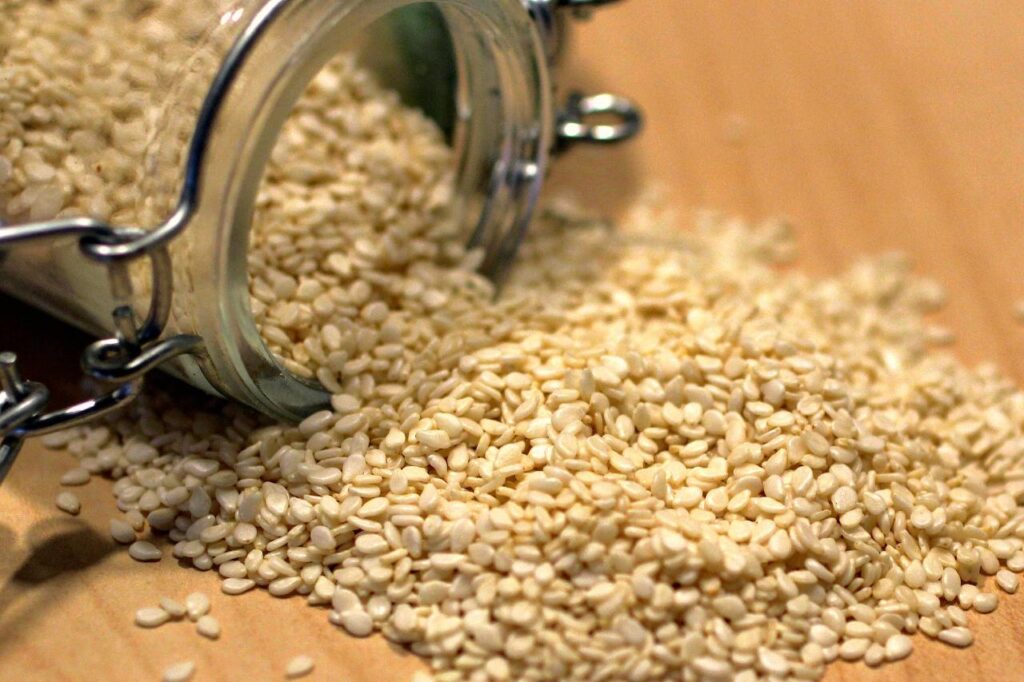Sesame seeds, renowned for their versatility and high oil content, have long held a significant place in international trade. As a staple in various cuisines and an essential ingredient in many industries, the demand for sesame seeds continues to grow globally. Here, we’ll explore the fundamentals of the sesame seed market, analyze the major players, and identify trends shaping the future of sesame seed import and export.
1. Overview of the Sesame Seed Market
Sesame seeds are primarily valued for their oil, which constitutes about 45-60% of the seed’s weight. This oil is rich in antioxidants and contains linoleic acid, which has numerous health benefits, making it a favorite in both culinary and cosmetic applications. The market is divided into three main segments:
- Culinary: Sesame seeds are commonly used as a garnish in various dishes or ground into pastes (like tahini) and oils.
- Industrial: Sesame oil is also widely used in cosmetics and pharmaceuticals for its moisturizing and anti-inflammatory properties.
- Nutritional Supplements: Sesame seeds and oil are marketed as healthy foods, contributing to high demand in health-conscious markets.
2. Major Exporters of Sesame Seeds
Several countries dominate sesame seed production and export. These regions are primarily characterized by climates conducive to sesame cultivation and include:
- India: As one of the largest exporters, India’s sesame seed industry is divided into different types based on seed color and quality. Its primary importers are the Middle East, the U.S., and Europe.
- Sudan: Known for its high-quality white sesame seeds, Sudan exports to many countries, including China and Japan. Sudanese sesame is renowned for its flavor and is preferred in high-value markets.
- Nigeria: Nigeria has seen a rise in sesame seed production due to supportive government policies and growing demand. The country primarily exports to Japan, Turkey, and the Middle East.
- Ethiopia: Another significant exporter, Ethiopia, has a strong agricultural sector focused on sesame seed production. Ethiopian sesame is mainly exported to Israel, China, and Europe.
- Myanmar: Southeast Asia’s leading producer, Myanmar, primarily exports to China and Thailand. The country’s favorable climatic conditions and labor costs contribute to competitive pricing.
3. Major Importers of Sesame Seeds
The demand for sesame seeds is particularly high in regions with established culinary traditions that incorporate the seed or oil, including:
- China: As the largest importer, China’s demand is driven by culinary use and oil production. Domestic production can’t keep up with demand, so it relies on imports from Africa and Southeast Asia.
- Japan: Known for its high standards, Japan imports high-quality sesame seeds, particularly from Ethiopia and Sudan. Sesame oil is integral in Japanese cuisine, and the country often pays premium prices for quality.
- South Korea: Another key market, South Korea imports sesame seeds largely for oil extraction and culinary use.
- The United States: With a growing demand for health foods and natural products, the U.S. imports sesame seeds for both culinary and cosmetic industries, mainly from India and Latin America.
- European Union: The EU has a steady demand for sesame seeds, driven by the food, cosmetics, and health sectors. Regulatory standards in the EU, however, are strict, impacting suppliers.
4. Factors Influencing the Global Sesame Seed Market
Several factors influence sesame seed production, prices, and trade patterns:
- Climatic Conditions: Sesame is highly sensitive to rainfall, temperature, and soil quality. Variability in weather can significantly impact yields, with droughts or floods reducing supply and increasing prices.
- Global Demand for Health Foods: Sesame seeds are rich in antioxidants and essential nutrients, making them popular in the health food sector. Increasing awareness about nutrition has driven up global demand.
- Market Prices: Fluctuations in sesame seed prices are often influenced by the supply-demand imbalance, climatic changes, and political stability in producing countries. Price variations impact the affordability of sesame seeds in importing nations.
- Government Policies and Trade Agreements: Export incentives, tariffs, and trade agreements can either support or hinder sesame trade. Policies that encourage agricultural exports are particularly beneficial for emerging sesame exporters like Nigeria and Ethiopia.
- Quality Standards and Certifications: Importers, especially in the EU and Japan, have stringent quality and safety standards. Certifications like organic or non-GMO can fetch premium prices but require additional investment from producers.

5. Trends and Future Prospects in the Sesame Seed Market
The sesame seed market is projected to grow due to several emerging trends:
- Organic and Specialty Sesame Seeds: Demand for organic, non-GMO, and sustainably sourced sesame seeds is growing. Consumers are increasingly willing to pay for organic certifications, especially in Europe and North America.
- Expansion in New Markets: Traditionally, sesame seeds were primarily traded in Asia and the Middle East. However, rising health consciousness has opened new markets in North America, Europe, and Australia.
- Value Addition and Processing: To increase profit margins, some exporters have shifted to value-added products like sesame oil and tahini. This trend is particularly relevant for producers in countries like Israel and Lebanon, which have strong domestic markets for these products.
- Technological Advancements: Improved seed varieties, better irrigation, and mechanized farming practices have boosted productivity. Technology also aids in sorting and quality control, improving the marketability of sesame seeds in stringent markets.
6. Challenges in the Sesame Seed Market
The global sesame seed market faces certain challenges, such as:
- Supply Chain Inefficiencies: Developing countries often struggle with logistical challenges, which increase costs and reduce profit margins. Improving these areas could make countries like Nigeria and Sudan more competitive.
- Quality Control: Meeting international standards can be challenging, especially for exporters from developing countries with limited resources. Contamination risks, especially with aflatoxins, can lead to export bans or restrictions.
- Currency Fluctuations: As a globally traded commodity, sesame prices can be affected by currency fluctuations, impacting profitability for exporters.
- Political and Economic Instability: Many top sesame-producing countries face political instability, which can disrupt production and export, creating supply shortages and price hikes.
7. How to Enter the Sesame Seed Export and Import Market
For businesses considering entering the sesame seed market, the following steps can be helpful:
- Market Research: Understanding target markets, including price points, consumer preferences, and regulatory standards, is essential.
- Source Reliable Suppliers or Buyers: For exporters, working with trusted suppliers is crucial to ensure quality. For importers, establishing relationships with reliable exporters in countries like India or Nigeria is key.
- Quality Assurance and Certifications: Meeting international quality standards can help access premium markets, especially for organic and high-grade seeds.
- Logistics and Distribution Planning: Efficient supply chain management can reduce costs and improve delivery times. Partnering with reputable logistics companies familiar with the nuances of agricultural commodities is beneficial.
- Adapt to Market Dynamics: Keep an eye on consumer trends and adjust your offerings accordingly. For instance, offering organic or non-GMO sesame seeds can appeal to health-conscious markets.
8. Conclusion
The sesame seed export and import market is vibrant and full of opportunities. However, it also comes with unique challenges, especially for producers in developing regions. By understanding the dynamics of the market, including major players, trends, and influencing factors, businesses can position themselves strategically for success. Whether it’s exporting high-quality seeds or importing for culinary and industrial use, the sesame seed market offers promising returns for those who can navigate its complexities effectively.
Ajigofarms is a reliable global agricultural purchase sourcing with profound expertise in the manufacturing, and exportation of food crops. We are tested, and trusted suppliers of all kinds of cash crops and food crops. Our constant supply chain solution makes exporting easy, quick, and safe, we are identified with timeliness and meeting up with deadlines. Regardless of the region you are located in worldwide, you can reliably order your Agric products and be rest assured of successful delivery.




